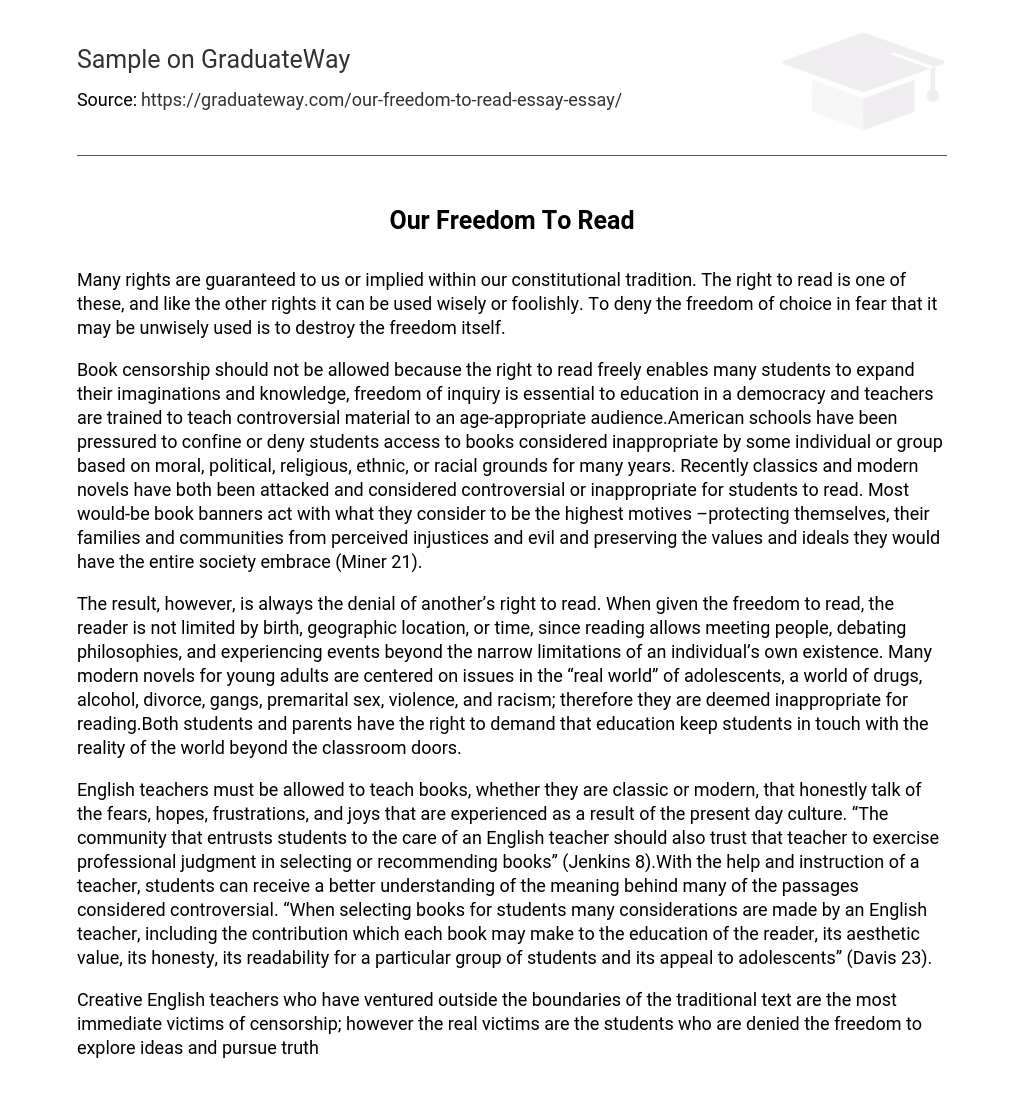Within our constitutional tradition, numerous rights are either granted or implicitly understood. The right to read is among these rights, and akin to other rights, it can be exercised judiciously or imprudently. Eliminating the freedom itself by withholding the choice for fear of it being utilized unwisely is counterproductive.
Book censorship should not be allowed because the right to read freely enables many students to expand their imaginations and knowledge, freedom of inquiry is essential to education in a democracy, and teachers are trained to teach controversial material to an age-appropriate audience. American schools have been pressured to confine or deny students access to books considered inappropriate by some individuals or groups based on moral, political, religious, ethnic, or racial grounds for many years. Recently, both classics and modern novels have been attacked and deemed controversial or inappropriate for student reading. Most proponents of book censorship act with what they believe are the highest motives – protecting themselves, their families, and communities from perceived injustices and evil, and preserving the values and ideals they want the entire society to embrace (Miner 21).
The outcome, however, is always the refusal to let others read. When granted the liberty to read, the reader is not restricted by birth, location, or time, as reading enables interaction with people, deliberation of philosophies, and exposure to events outside of one’s own limited existence. Numerous contemporary novels targeting young adults tackle issues prevalent in the real world of teenagers – such as drugs, alcohol, divorce, gangs, premarital sex, violence, and racism – hence they are considered inappropriate for reading. Both students and parents have the right to demand that education maintains students’ connection with the realities extending beyond the confines of the classroom.
English teachers should have the freedom to teach both classic and modern books that honestly explore the fears, hopes, frustrations, and joys of contemporary culture. According to Jenkins (8), the community that entrusts students to an English teacher should also trust their professional judgment in book selection. With guidance from teachers, students can gain a deeper understanding of controversial passages. Davis (23) explains that when choosing books for students, English teachers consider various factors such as the book’s educational contribution, aesthetic value, honesty, readability for specific student groups, and appeal to adolescents.
In a democratic society, it is crucial that individuals have the right to read whatever they choose. Unfortunately, censorship affects innovative English teachers who go beyond traditional texts. However, the ones who suffer the most are students as they are denied the freedom to explore ideas and search for truth in their own way. This freedom of inquiry is essential in education but many schools have removed certain books from their libraries and English teachers are hesitant to use works that might upset the community. As a result, students receive an education in an environment that discourages free inquiry (Burress 17).
When teachers become preoccupied with job security, they neglect their students’ needs, leading to a loss of their role as catalysts for adventurous thinking. Instead, a stifling dogma replaces free inquiry, discouraging the pursuit of knowledge and cutting discussions short. To rekindle the thirst for exploration in the classroom, it is crucial to eliminate censorship, allowing teachers to feel at ease in carrying out their duties. A common belief held by many is that censorship serves the purpose of protecting students under the premise of “what you don’t know can’t hurt you.”
Schools and teachers have the responsibility of acting as parents to students, ensuring their welfare. However, if teachers allow young adults to read inappropriate or overly mature material, they are impeding on parents’ rights to share their beliefs and values with their children. This can expose students to unnecessary situations like violence, rape, sex, drugs, and profanity in their reading. By protecting students from these harmful passages in books, we preserve their innocence and ensure their safety.
However, censorship in schools leads to an incomplete and distorted understanding of cultural ideals, values, and issues (Jenkins 13). Due to concerns about censorship, many authors are either not adequately represented in public schools or their works are selected for anthologies based on safety and lack of offensiveness. Some books have faced criticisms such as being labeled as “filthy,” “un-American,” “too realistic,” or “anti-war.” Controversial books have even been attacked, suggesting that some people view education as a means of indoctrination rather than intellectual exploration of ideas (Burress 9).
The primary goal of the school should be to assist students in their intellectual development and maturation. It is crucial for the community to have confidence in the English education teachers’ knowledge and training when they choose books that will aid in this progress. In a society that values basic rights and freedoms, it is not acceptable to restrict or censor the freedom to read or explore. As Wallace Stevens eloquently stated, “Literature is necessary for a fulfilling life.”
To add to this, it appears necessary without a doubt, as long as life is the more significant aspect of literature. ”





